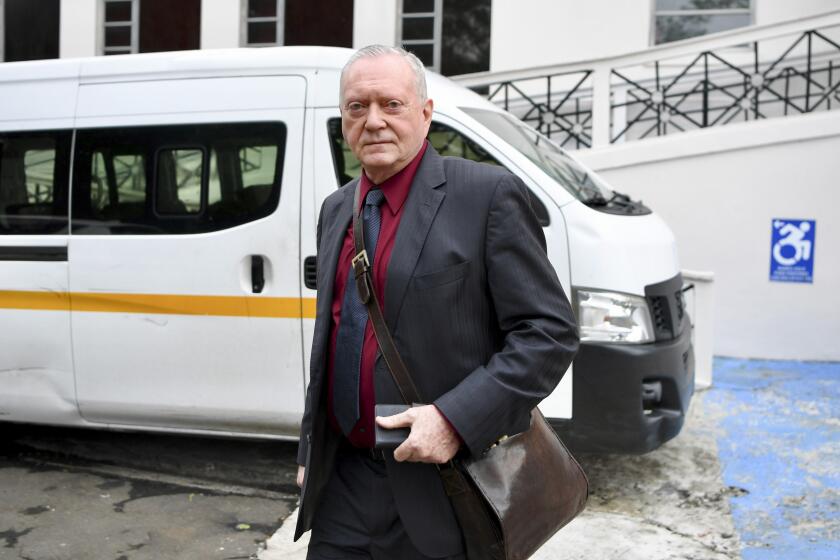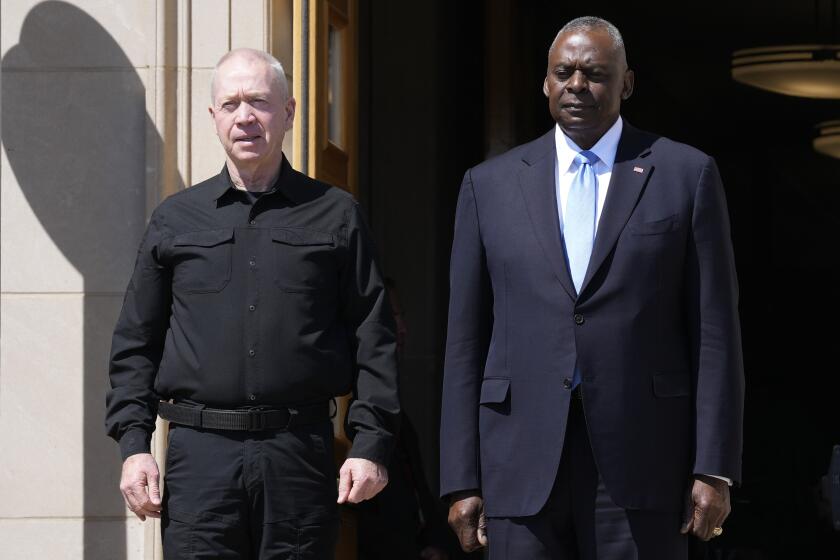Gaza families mourn amid rubble as fighting rages on
As sunset approached Sunday, a steady stream of men walked the darkening streets toward Gaza City’s Al Nafaq district to pay their respects to the Atallah family.
In an open-air enclosure up a side street, dozens of mourners sat on plastic chairs. A loudspeaker blared a sermon lamenting the misfortunes of a family that lost six members in an Israeli airstrike.
“I ask God to take them into heaven. I ask God to give their relatives patience,” the imam said. He then struck an angrier, more defiant tone. “Every martyr gives birth to 1,000 more martyrs! We liberated Gaza, and soon we will liberate Jerusalem!”
As the surging conflict between Israel and the Hamas-controlled Gaza Strip continued for a fifth day, residents here paused to bury their dead while the casualty toll continued to rise around them.
Several times during the Atallah family’s memorial, loud booms could be heard nearby as more missiles struck.
Aircraft continued to pound what Israel says are militant strongholds and sites used to launch rockets at Israeli towns Sunday, before troops withdrew from the territory today.
Israel launched the latest incursion into Gaza in an attempt to stop such attacks. Thousands of rockets have struck Israeli communities near the coastal strip in the last seven years, killing 13 people.
Palestinian officials said at least 12 people were killed Sunday, most of them militants fighting in Jabaliya. The Palestinian death toll since the fighting surged Wednesday is at least 110, a number the Health Ministry in Gaza says includes 39 civilians. Two Israeli soldiers have died in the assault, and an Israeli civilian was killed last week by a rocket attack on his town.
The Israeli military says it does not target civilian sites, but attacks by warplanes and tanks in the crowded strip make such casualties almost inevitable.
At least 10 people from three generations were in the Atallah household when the missile struck Saturday just before sunset.
Medhat Abdullah, a relative of the family, was at work nearby when he heard the news. He arrived to find the home almost flattened, the walls collapsed and the ceiling caved.
“It’s a massacre. When you kill a whole family, what else do you call it?” he asked. “What am I supposed to do? Forgive [the Israelis]?”
Among the dead in the Atallah family were patriarch Abdel Rahman Atallah, 65, his wife, Suad, two sons and two daughters. One of Atallah’s grandchildren, a 23-month-old baby, was pulled from the rubble alive but suffering from oxygen deprivation. The child remains in the intensive care unit of a Gaza City hospital on an artificial respirator.
The dead must be buried promptly according to Islamic custom, but relatives still hadn’t recovered all the bodies in time for the funeral Sunday afternoon.
The final two bodies, almost unrecognizable, were pulled from the rubble after the funeral procession had already left, Abdullah said. They were wrapped in blankets and rushed to the cemetery.
Abdullah said there were no militant strongholds in the area, and no factories for making Kassam rockets.
One of Abdel Rahman Atallah’s sons was a member of the Executive Force, a Hamas-led police unit, and may have been involved in launching rockets into Israel, Abdullah said. But that, he said, did not justify the missile strike.
“Even if [Hamas leader] Ismail Haniyeh himself were inside, that’s not a reason to attack a house full of children,” he said.
Less than 10 minutes away, Nasser Borai said evening prayers in the front of what remained of his small family home. Massive posters on the walls depicted two starkly different images of his 6-month-old son, Mohammed.
The first showed the puffy-cheeked infant in good health on Wednesday, just hours before he died. In the second poster, the lifeless baby’s eyes are closed and wounds cover the upper left corner of his face.
The rubble of Borai’s home is filled with mementos of his son’s short life: an orange plastic washbasin, a fat-wheeled tricycle, the collapsed remains of a highchair.
The 29-year-old former police officer and his wife, Eman, had been married five years but were unable to conceive until Mohammed arrived.
In a chillingly calm monotone, Borai recounted the final night of his son’s life.
The couple and the infant were in bed just before 11 p.m. when four missiles slammed into an Interior Ministry building across the street. One was a dud, but the force of the other explosions punched through the apartment walls, throwing furniture across the room and knocking out chunks of the roof.
“My wife started to scream, ‘The boy! The boy!’ ” Borai said.
The electricity cut out. As Borai groped in the dark among the rubble covering the bed, he heard a soft moan.
“I followed the sound and grabbed Mohammed by the leg and pulled him out,” he said.
Relatives rushed the infant to the hospital while Borai ensured that his wife was all right. By the time he made it to the hospital, he found a team of doctors frantically working to save his baby using CPR.
“I could tell from the doctors’ faces that there was no hope,” he said.
--
More to Read
Start your day right
Sign up for Essential California for news, features and recommendations from the L.A. Times and beyond in your inbox six days a week.
You may occasionally receive promotional content from the Los Angeles Times.






